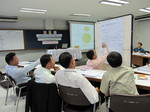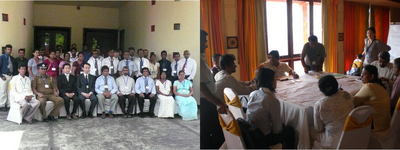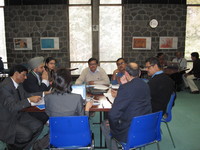Activity Report
El Salvador, Nicaragua, Guatemala
February 28 - March 12, 2010
ICA conducted a follow-up survey for ex-participants of the training course of Disaster Control for Central America, which has been taking place in Japan every year since 2000.
Although Central American countries are not ADRC member countries, one ADRC senior researcher joined this survey mission in Central America to evaluate the training course, and to learn current efforts which have been taken by them after joining the training course in order to gain good inputs for ADRC's similar training courses.
Many ex-participants said that they had learned the spirits and culture of disaster management (BOSAI) in Japan, such as focusing more on prevention rather than response, integration of disaster risk reduction into school education, high awareness of communities and individuals for disaster risk reduction, and efforts to hand over the lesson learned from the past disasters to next generation. And learning from these experiences in Japan, they have been conducting various activities after their return home.
On the other hand, following things are pointed out as the issues to be improved; 1) too many lectures on the Great Hanshin-Awaji Earthquake, 2) less lectures of other disasters, 3) less interactive sessions, 4) not enough time for the questions & answers session, 5) a few chances to visits communities, 6) less time for discussion among participants for their own experiences and what they learned in Japan, 7) some handouts are not translated to Spanish, 8) too much time for interpretation, 9) training schedule should be set for certain period of time every day.
And they recommended the following points for the future training course, 1) the training should be linked to HFA and regional disaster reduction plan in Central America, 2) there should be a good communication with ex-participants when nominating new participants and conducting pre-course lectures, 3) Action plans should be developed in concrete and achievable manners, 4) Action plans should be introduced in a meeting right after their return home, 5) all documents in the training course should be distributed in digital data, 6) there should be some opportunities and places to exchange information and experiences among ex-participants, 7) the second phase training course should be developed for ex-participants after they conducted various activities.
JICA will make a final report shortly including the interview result to the ex-participants.
(2010/3/25 16:40)
Thailand and the Philippines
February - March 2010
From late February through early March 2010, the Asian Disaster Reduction Center (ADRC) conducted trainings for government officials in charge of disaster management with Thailand's Department of Disaster Prevention and Mitigation (DDPM), and Philippines' Office of Civil Defense (OCD) and National Disaster Coordination Council (NDCC) in Bangkok and Manila respectively. (Photos: Thailand and the Philippines, from above)
 The trainings are part of ASEAN cooperation project Capacity Building of Local Government Officials on Disaster Management. ASEAN's national disaster management organizations and the ADRC conduct training for trainers (TOT) and then the trainers give lectures at workshops for local government officials in each country.
The trainings are part of ASEAN cooperation project Capacity Building of Local Government Officials on Disaster Management. ASEAN's national disaster management organizations and the ADRC conduct training for trainers (TOT) and then the trainers give lectures at workshops for local government officials in each country.
 During this TOT in Thailand and the Philippines, the participants took lectures on various DRR/DRM topics developed by experts from each country such as the institutional framework of DM system in their countries and disaster-specific issues including flood, tropical storm, earthquake and tsunami. The two trainings drew positive response from the attendants, resulting in active discussion among them over the covered topics and coming workshops. They will give lectures as trainers in subsequent workshops for local officials, which are scheduled in the middle of this year.
During this TOT in Thailand and the Philippines, the participants took lectures on various DRR/DRM topics developed by experts from each country such as the institutional framework of DM system in their countries and disaster-specific issues including flood, tropical storm, earthquake and tsunami. The two trainings drew positive response from the attendants, resulting in active discussion among them over the covered topics and coming workshops. They will give lectures as trainers in subsequent workshops for local officials, which are scheduled in the middle of this year.
(2010/03/08 17:40)
18-19 February 2010 (Kandy, Sri Lanka)
 The ADRC joined the "Workshop on Transfer of Japanese Disaster Management Measures to Enhance Self/Mutual-help Capacity in Community of Sri Lanka" held in Kandy, Sri Lanka from 18-19 February 2010. The workshop was organised by the Cabinet Office of Japan, Disaster Management Centre (DMC) of Sri Lanka and Tokio Marine & Nichido Risk Consulting Co., Ltd.
The ADRC joined the "Workshop on Transfer of Japanese Disaster Management Measures to Enhance Self/Mutual-help Capacity in Community of Sri Lanka" held in Kandy, Sri Lanka from 18-19 February 2010. The workshop was organised by the Cabinet Office of Japan, Disaster Management Centre (DMC) of Sri Lanka and Tokio Marine & Nichido Risk Consulting Co., Ltd.
In the workshop, the ADRC made a presentation on disaster risk assessment and its efforts in Japan and also conducted a town watching program on both days. The target area for the town watching has been considered as a high risk area of flooding to be caused by dam break in the near future. DMC has been preparing for the expected disaster through the awareness raising of local government officials and community people in the area, as well as developing hazard maps. The workshop offered a good opportunity to enhance understanding and recognition of risks in the area among high level officials in the concerned local government and agencies.
(2010/02/26 16:50)
15-19 February 2010 (New Delhi, India)
IRP and UNDP India jointly organized the first phase of national consultations on the development of "Guidance Notes for Recovery" to be used by national governments to ensure "build back better". The Guidance Notes shall highlight lessons learned and good practices from global recovery operations, covering the sectors: Livelihood, Environment, Gender, Governance, Public Infrastructure, Shelter, Health, Psycho-social Aspects, and Climate Change Adaptation.
The national consu ltations (Phase I) were held at UNDP Conference Room, New Delhi, 15-19 February 2010. Over 50 Indian experts in the fields of livelihood, gender, environment, and governance participated in the consultations. Case studies, good practices, and stories on various aspects of recovery from the wealth of experience in recovery from disasters were drawn from the consultations. The Guidance Notes will offer "Menu of Options" for enhancing recovery operations, wherein practitioner determines the contextual relevance of those options. It is evidenced-based that highlights case studies and it is continually updating to generate new options.
ltations (Phase I) were held at UNDP Conference Room, New Delhi, 15-19 February 2010. Over 50 Indian experts in the fields of livelihood, gender, environment, and governance participated in the consultations. Case studies, good practices, and stories on various aspects of recovery from the wealth of experience in recovery from disasters were drawn from the consultations. The Guidance Notes will offer "Menu of Options" for enhancing recovery operations, wherein practitioner determines the contextual relevance of those options. It is evidenced-based that highlights case studies and it is continually updating to generate new options.
(2010/03/02 14:40)
8-19 February 2010 (Vienna , Austria
The Forty-Seventh Session of the Scientific and Technical Subcommittee of the Committee on the Peaceful Uses of Outer Space (UN-COPUOS)was held from 8 to 19 February 2010 at the United Nations Office in Vienna , Austria
ADRC took part in both events. At the technical subcommittee of COPUOS, ADRC introduced its major activities and accomplishments. Two key activities were highlighted. Firstly, ADRC serves as focal point for Sentinel Asia in facilitating, emergency observations in the event of disasters. Secondly, ADRC implements capacity building activities on the use of satellites data among its member countries. At the UN-SPIDER RSO Meeting, ADRC presented its activities and accomplishments as RSO as well as its future plans. The RSO meeting provided an opportunity to discuss frankly, exchange of opinions, and explore measures of enhancing future activities of ADRC in line with the objectives of UN-SPIDER.
(2010/02/20 19:20)
Thailand and the Philippines
February - March 2010
From late February through early March 2010, the Asian Disaster Reduction Center (ADRC) conducted trainings for government officials in charge of disaster management with Thailand's Department of Disaster Prevention and Mitigation (DDPM), and Philippines' Office of Civil Defense (OCD) and National Disaster Coordination Council (NDCC) in Bangkok and Manila respectively. (Photos: Thailand and the Philippines, from above)
 The trainings are part of ASEAN cooperation project Capacity Building of Local Government Officials on Disaster Management. ASEAN's national disaster management organizations and the ADRC conduct training for trainers (TOT) and then the trainers give lectures at workshops for local government officials in each country.
The trainings are part of ASEAN cooperation project Capacity Building of Local Government Officials on Disaster Management. ASEAN's national disaster management organizations and the ADRC conduct training for trainers (TOT) and then the trainers give lectures at workshops for local government officials in each country.
 During this TOT in Thailand and the Philippines, the participants took lectures on various DRR/DRM topics developed by experts from each country such as the institutional framework of DM system in their countries and disaster-specific issues including flood, tropical storm, earthquake and tsunami. The two trainings drew positive response from the attendants, resulting in active discussion among them over the covered topics and coming workshops. They will give lectures as trainers in subsequent workshops for local officials, which are scheduled in the middle of this year.
During this TOT in Thailand and the Philippines, the participants took lectures on various DRR/DRM topics developed by experts from each country such as the institutional framework of DM system in their countries and disaster-specific issues including flood, tropical storm, earthquake and tsunami. The two trainings drew positive response from the attendants, resulting in active discussion among them over the covered topics and coming workshops. They will give lectures as trainers in subsequent workshops for local officials, which are scheduled in the middle of this year.
(2010/03/08 17:40)
 The ADRC joined the "Workshop on Transfer of Japanese Disaster Management Measures to Enhance Self/Mutual-help Capacity in Community of Sri Lanka" held in Kandy, Sri Lanka from 18-19 February 2010. The workshop was organised by the Cabinet Office of Japan, Disaster Management Centre (DMC) of Sri Lanka and Tokio Marine & Nichido Risk Consulting Co., Ltd.
The ADRC joined the "Workshop on Transfer of Japanese Disaster Management Measures to Enhance Self/Mutual-help Capacity in Community of Sri Lanka" held in Kandy, Sri Lanka from 18-19 February 2010. The workshop was organised by the Cabinet Office of Japan, Disaster Management Centre (DMC) of Sri Lanka and Tokio Marine & Nichido Risk Consulting Co., Ltd.In the workshop, the ADRC made a presentation on disaster risk assessment and its efforts in Japan and also conducted a town watching program on both days. The target area for the town watching has been considered as a high risk area of flooding to be caused by dam break in the near future. DMC has been preparing for the expected disaster through the awareness raising of local government officials and community people in the area, as well as developing hazard maps. The workshop offered a good opportunity to enhance understanding and recognition of risks in the area among high level officials in the concerned local government and agencies.
15-19 February 2010 (New Delhi, India)
IRP and UNDP India jointly organized the first phase of national consultations on the development of "Guidance Notes for Recovery" to be used by national governments to ensure "build back better". The Guidance Notes shall highlight lessons learned and good practices from global recovery operations, covering the sectors: Livelihood, Environment, Gender, Governance, Public Infrastructure, Shelter, Health, Psycho-social Aspects, and Climate Change Adaptation.
The national consu ltations (Phase I) were held at UNDP Conference Room, New Delhi, 15-19 February 2010. Over 50 Indian experts in the fields of livelihood, gender, environment, and governance participated in the consultations. Case studies, good practices, and stories on various aspects of recovery from the wealth of experience in recovery from disasters were drawn from the consultations. The Guidance Notes will offer "Menu of Options" for enhancing recovery operations, wherein practitioner determines the contextual relevance of those options. It is evidenced-based that highlights case studies and it is continually updating to generate new options.
ltations (Phase I) were held at UNDP Conference Room, New Delhi, 15-19 February 2010. Over 50 Indian experts in the fields of livelihood, gender, environment, and governance participated in the consultations. Case studies, good practices, and stories on various aspects of recovery from the wealth of experience in recovery from disasters were drawn from the consultations. The Guidance Notes will offer "Menu of Options" for enhancing recovery operations, wherein practitioner determines the contextual relevance of those options. It is evidenced-based that highlights case studies and it is continually updating to generate new options.
(2010/03/02 14:40)
8-19 February 2010 (
The Forty-Seventh Session of the Scientific and Technical Subcommittee of the Committee on the Peaceful Uses of Outer Space (UN-COPUOS)was held from 8 to 19 February 2010 at the United Nations Office in
ADRC took part in both events. At the technical subcommittee of COPUOS, ADRC introduced its major activities and accomplishments. Two key activities were highlighted. Firstly, ADRC serves as focal point for Sentinel Asia in facilitating, emergency observations in the event of disasters. Secondly, ADRC implements capacity building activities on the use of satellites data among its member countries. At the UN-SPIDER RSO Meeting, ADRC presented its activities and accomplishments as RSO as well as its future plans. The RSO meeting provided an opportunity to discuss frankly, exchange of opinions, and explore measures of enhancing future activities of ADRC in line with the objectives of UN-SPIDER.

